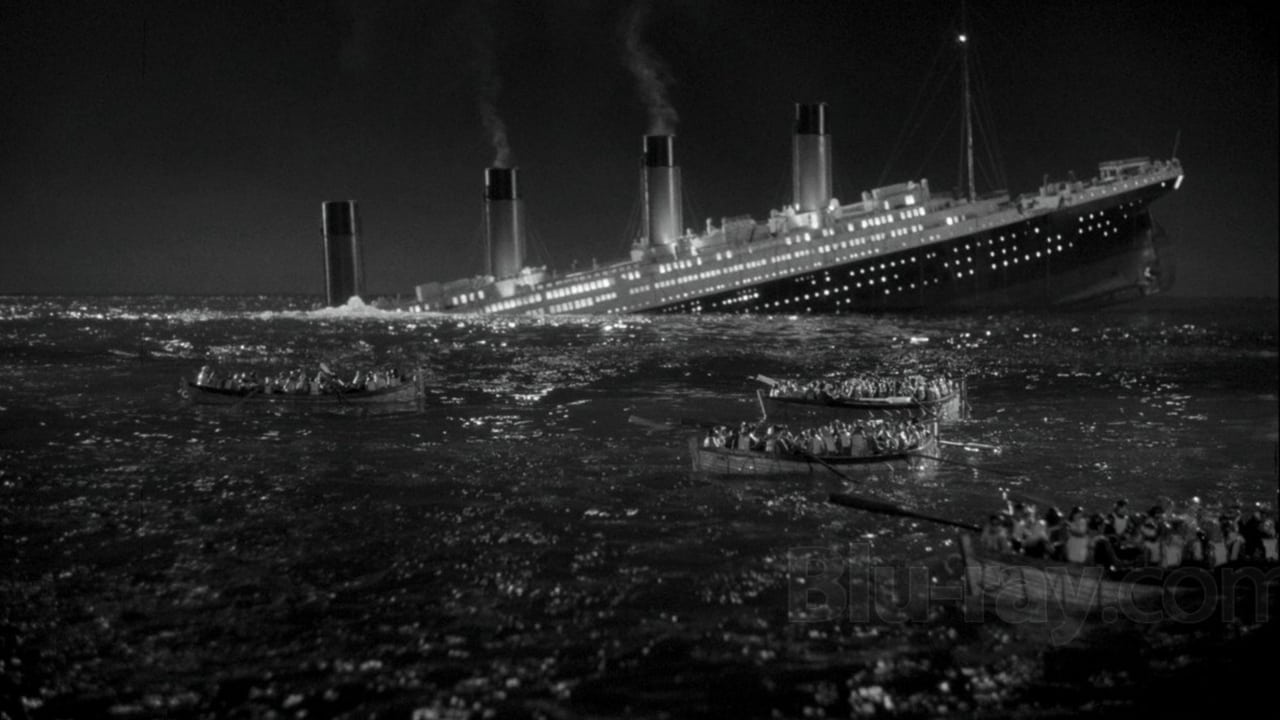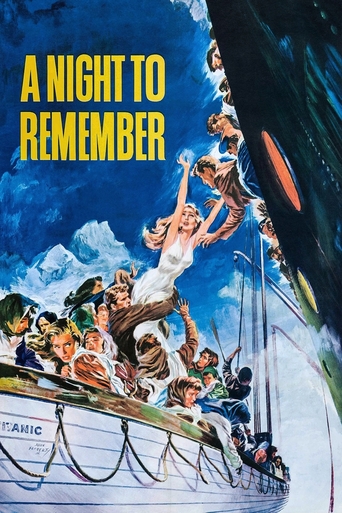

Good start, but then it gets ruined
... View MoreBest movie ever!
... View MoreAn action-packed slog
... View MoreThere is, somehow, an interesting story here, as well as some good acting. There are also some good scenes
... View MoreThe luxury cruise ship the Titanic sinks after hitting an iceberg during its maiden voyage. Director Roy Ward Baker and screenwriter Eric Ambler wisely eschew cheap sentiment and overblown melodramatic flourishes in favor of a more admirably subtle and restrained documentary-style sense of realism and authenticity that just the same still astutely captures the heart-wrenching tragedy of the catastrophic event. Indeed, there are many poignant and striking moments throughout: The rich lady who refuses to leave without her lucky china pig, a father saying a final goodbye to his wife and children, Benjamin Guggenheim (a marvelously smooth performance by Harold Goldblatt) deciding not to wear a life jacket so he can die as a gentleman, the band playing right til the bitter end, Ida Strauss insisting on staying aboard with her beloved husband, the brave crew doing whatever they can to mitigate the severity of the situation, and an old waiter attempting to comfort an abandoned child in the worst possible crisis. While Kenneth More clearly holds the entire epic picture together with his outstanding portrayal of the stalwart and fiercely efficient Second Officer Charles Lightoller, he nonetheless receives sterling support from Laurence Naismith as the resolute Captain Edward John Smith, Frank Lawton as the cowardly J. Bruce Ismay, Michael Goodlife as proud and pragmatic designer Thomas Andrews, Tucker McGuire as the boisterous Margaret "Molly" Brown, George Rose as the drunken baker Charles Joughin, and David McCallum and Kenneth Griffith as a couple of exceptionally selfless and dedicated wireless officers. However, it's the artful way this film combines a feeling of epic scope and basic human drama without one overwhelming the other that stands out as the key reason it's widely hailed as the definitive motion picture about the sinking of the supposedly unsinkable Titanic. Essential viewing.
... View MoreA Night to Remember is, on the face of it, a straightforward account of the sinking of the Titanic. The film wields great emotional power, however, in its portrayal of the lives and backgrounds of a varied cross section of the passengers, showing us how the tragedy touches each of them. The historical setting is Edwardian England, a time often looked back on in Britain as a golden age of prosperity and peace, despite the pronounced class divisions in British society at the time. Very soon the Edwardian age would be shattered forever by the First World War, and maybe the film portrays the 'impossible' sinking of the Titanic, and the effects on its passengers and crew, as a dark foreshadowing of that terrible war. We follow the preparation of 2nd Officer Charles Lightoller, played by Kenneth More, for the voyage and journey to the port. An aristocratic couple in their elegant horse and carriage are waved off by children of the local workhouse; in rural Ireland, a group of men of more modest means set off in their horse and cart to board at Belfast, destined for ship's quarters far removed from the opulence of first class.There is a huge cast of mostly British character actors. Many of them had recently come through the events of the Second World War, many serving in the armed forces, and were no stranger to hardship; the strain is etched on the faces. This lends the acting great conviction. Kenneth More, who served in the Royal Navy, is superb as the epitome of the unflappable British officer, but there are good performances throughout the cast.The realism is reinforced by the scenes of the ship's interior, and the sinking itself is well portrayed for the special effects standards of the time. Tension is stretched to breaking point as we see the crews of the other ships in the area either mistake the distress signals for celebratory fireworks or realise they are too far away to effect a rescue.Every human emotion, good and bad, is on display, particularly in the desperate scramble for the limited lifeboat space. It really was 'women and children first' in those days and we are treated to some of the most poignant scenes ever committed to celluloid as fathers are separated from their families, a lost child is comforted by an old, kindly, steward, and the band plays 'Nearer, My God, to Thee' on the steeply inclined deck. The film leaves you with a deep sympathy for the hundreds who lost their lives, and the sense that hubris and humility are flip sides of the same coin.
... View MoreThe original adaptation of the "Ship of Dreams", 'A Night to Remember' is a riveting and emotional study of the fateful maiden voyage of the RMS Titanic. A British production made on location at Pinewood Studios, Roy Baker's meticulous re-creation of the sinking of the Titanic is an utter masterpiece of cinema. The scale of the sets, the ingenuity of the visual effects and the stellar performances all make this a 1950's Brit-blockbuster at its very best. Whilst the '97 adaptation from James Cameron is a powerful piece of cinema, this stunning and melodramatic 1958 flick spends its 2-hour duration focussing on the lives of everybody aboard the ship instead of wandering off to study a love story between two characters. A film that relies on real-life survivor testimony, 'A Night to Remember' is in my opinion the best adaptation of the tale of the "unsinkable" ship and one of the best British films to have ever graced the screen.
... View More*NOTE* I am going to compare this film to the James Cameron version a lot. Listen. I don't hate his version. Its just that I found it very hard to watch and a lot of things bothered me in that film which I will explain in this review. I just think Roy Ward Baker's version is better.I rented this film on ITunes from the Criterion Collection. To begin with, this is one of the greatest films ever made and I am so glad I rented it. This is my first time watching it and I must say it is better than James Cameron's version. Why? For starters, there are no heroes or villains in this film. The main problem I had with this film is that the "Villains" in Cameron's version got away safely without any consequences. Also, the women in Cameron's film felt weaker being told off by the people on the boats.In this film, you don't need protagonists or antagonists, you just need the ship and the iceberg and the many extras that play the scared passengers to make one of the most shocking exhibitions ever put on film.Technically, the film looks amazing for the late 50's. There is so much going on in the background and it is awesome.I like how the film takes the POV's of passengers and crew members instead of focusing on 1 or 2 people like in Cameron's version. It gives us more space to explore around the ship with these characters.Very little music is put into this film. Mainly because director Baker did not want to ruin the frightening atmosphere of the sinking unsinkable ship.I loved everything about this film. It is one of the greatest films of all time. People must experience this eye capturing movie that you cannot take your eyes off of.100/100 A+
... View More